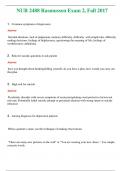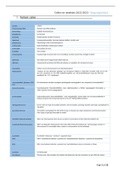NUR 2488 Rasmussen Exam 2, Fall 2017
1. Common symptoms of depression
Answer
Suicidal ideations, lack of judgement, memory difficulty, difficulty with simple taks, difficulty
making decisions, feelings of helplessness, questioning the meaning of life, feelings of
worthlessness, anhedonia
2. Risk for suicide, questions to ask patient
Answer
have you thought about hurking/killing yourself, do you have a plan, how would you carry out
that plan
3. High risk for suicide
Answer
Psychiatric disorder with severe symptoms of acute precipitating event protective factors not
relevant, Potentially lethal suicide attempt or persistent ideation with strong intent or suicide
rehearsal
4. nursing diagnosis for depression patients
When a patient is mute, use the technique of making observations
"There are many new pictures on the wall" or "You are wearing your new shoes.". Use simple,
concrete words.
,Allow time for the patient to respond. Listen for covert messages and ask about suicide plans
Answer
"Have you had thoughts of killing or harming yourself in any way?". Avoid platitudes such as,
"Things will look up" or "Everyone gets down once in a while."
5. communication interventions in depression
Answer
Help the patient question under- lying assumptions and beliefs and consider an alternate
explanation to problems.
Work with the patient to identify cognitive distortions that encourage negative
self-appraisal. Encourage activities that can raise self-esteem. Identify the need for
(a) problem-solving skills, (b) coping skills, and (c) assertiveness skills. Discuss physical
activities the patient enjoys.
Encourage formation of supportive relationships, such as through support groups, therapy, and
peer support. Provide information referrals, when needed, for spiritual/religious information
(e.g., readings, programs, tapes, community resources).
6. Interventions for physical needs in depressed patients
Answer
Offer small,
high-calorie, and high-protein snacks frequently throughout the day and evening, Weigh the
patient weekly and observe the patient's eating patterns, Provide periods of rest after activities,
Monitor intake and output, especially bowel movements, Evaluate the need for laxatives and
enemas.
7. Commonly used SSRI's
Answer
Citalopram, Escitalopram, Fluoxetine, Paroxetine, Sertraline
, 8. Commonly used TCA's
Answer
Amitriptyline, Clomipramine, Desipramine, Doxepin, Imipramine, Nortriptyline, Trimipramine
9. Commonly Used MAOI's
Answer
isocarboxazid, phenelzine, tranylcypromine, selegiline
10. Potential effects of norepinephrine blockers
Answer
Decreased depression, Tremors, Tachycardia, Erectile and/or ejaculatory dysfunction
11. Potential effects of specific epinephrine blockers
Answer
Antipsychotic effect, Postural hypotension, Dizziness, Reflux tachycardia, Ejaculatory
dysfunction and/or impotence, Memory dysfunction
12. Potential effects of specific norepinephrine blockers
Answer
priapism
13. Potential effects of serotonin receptor blocker





